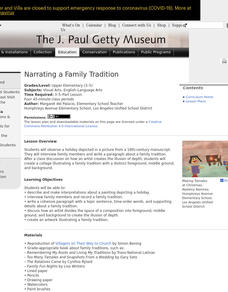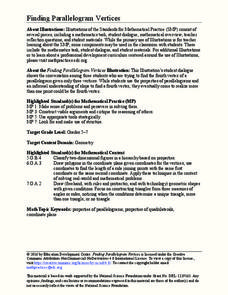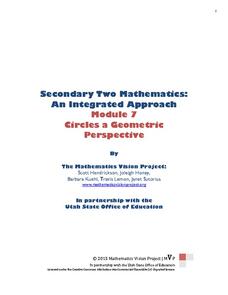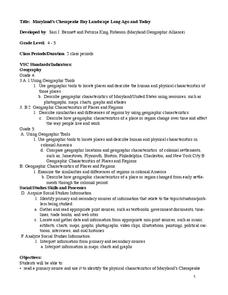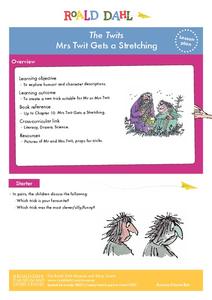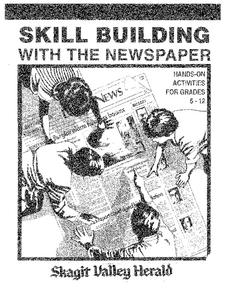Roald Dahl
Matilda - Miss Honey and The Trunchbull
As the instructor reads aloud several quotes from five chapters of the story Matilda, class members mime their interpretation of the scenes. Then, after reading "Miss Honey" and "The Trenchbull" (chapters seven and eight), the class...
J. Paul Getty Trust
Narrating a Family Tradition
After examining a piece of art, scholars discuss what they see, paying close attention to details and space. A read-aloud introduces the topic of family traditions. Pupils interview their family members about a tradition in preparation...
Curated OER
I Know An Old Lady
Have your young pupils complete a variety of activities related to the story "I Know an Old Lady." They act-out the story using puppets, visit the illustrator's website, discuss his cartoon drawings for the book, and generate a list of...
Education Development Center
Finding Parallelogram Vertices
Four is the perfect number—if you're talking about parallelograms. Scholars determine a possible fourth vertex of a parallelogram in the coordinate plane given the coordinates of three vertices. They read a conversation...
Teaching American History
Interpretation of the Declaration of Independence
Ready to interpret the Declaration of Independence and understand its meaning? The resource divides scholars into pairs, where they work as a team to match translations with excerpts from the declaration. The class then engages in...
Mathematics Vision Project
Circles: A Geometric Perspective
Circles are the foundation of many geometric concepts and extensions - a point that is thoroughly driven home in this extensive unit. Fundamental properties of circles are investigated (including sector area, angle measure, and...
ReadWriteThink
Teaching Point of View With Two Bad Ants
What better way to explain the concept of point of view than from an ant's perspective! After reading Two Bad Ants, pupils identify the point of view of the ants by studying the text and pictures. Then, they fill out a chart that...
Roald Dahl
Matilda - Bruce Bogtrotter and the Cake
After reading the 11th chapter in Matilda, class members take on the role of Bruce Bogtrotter and re-enact the cake eating scene. Here's the catch: they must come-up with an impromptu re-enactment of the scene from the story, and use...
Roald Dahl
Matilda - The New Home
Matilda finally gets her happy ending with a new home with Miss Honey. But first, Mr. Wormwood goes on trial for his wrong doings and bad car sales. Class members take on the role of a character in the trial and participate in a role...
Roald Dahl
The Twits - Mrs Twit
"A person who has good thoughts cannot ever be ugly." The second lesson in an 11-part unit that accompanies The Twits by Roald Dahl uses poetry to encourage positive character traits. Mrs. Twit has ugly thoughts, but those thoughts can...
Curated OER
Maryland’s Chesapeake Bay Landscape Long Ago and Today
Combine a fantastic review of primary source analysis with a study of Captain John Smith's influence on the Chesapeake Bay region in the seventeenth century. Your young historians will use images, a primary source excerpt, and maps...
Curated OER
Biopoem: Ender's Game
Here's an activity designed to encourage character analysis. Readers craft a biopoem for a character in Orson Scott Cards' popular science fiction novel Ender's Game.
Federal Reserve Bank
Arts and Economics Infographic Questionnaire
How do careers in the arts contribute to America's gross domestic product? Use an informative infographic that details the economic details of careers in the core arts, including design services, performing arts, and arts education, to...
Roald Dahl
Matilda - The First Miracle
As the story unfolds, readers discover Matilda has a superpower. Take part in an activity that has learners talking about what superpower they would have, how they would use it, and how it could help others. Then, after reading the 14th...
Roald Dahl
Matilda - The Weekly Test
Readers take the main characters in Matilda and individually describe them through a mnemonic. To get there, group members create an acrostic poem describing the character they were given, and choose one of the words from the acrostic...
American Museum of Natural History
The Legend of the Flying Frog
Young conservation biologists have an opportunity to get involved in the effort to save endangered species. After reading and illustrating the tale of the Flying Frog, they craft a tale about another fictional endangered species.
Smithsonian Institution
We Have a Story to Tell: Native Peoples of the Chesapeake Region
How did colonial settlement and the establishment of the United States affect Native Americans in the Chesapeake region? Your young historians will analyze contemporary and historical maps, read informational texts, and work in groups to...
Roald Dahl
Matilda - Arithmetic
Mr. Wormwood, one of the characters in Roald Dahl's Matilda, is not the most trustworthy of characters. Have student groups take on the roles of car salespeople and play a game to see who can make the most profit by selling refurbished...
Roald Dahl
The Twits - Mrs Twit Gets a Stretching
A cork, a rubber snake, and a bucket of mud may not seem like the best materials for washing a car, but they are in The Twits. The fifth lesson in an 11-part unit designed to accompany The Twits by Roald Dahl has readers role play...
Teaching Tolerance
Musical Movement Showcase
Young performing artists create a song or choreograph a dance to illustrate a theme in a text they are reading. Step-by-step directions are included.
Curated OER
Mitosis Cookies Activity
Reward biology learners for working hard in their mitosis lesson with a sweet snack at the end! They begin by twisting apart creme-filled cookies and using the icing as a cytoplasm. Colored candy sprinkles make up chromosome pairs, which...
It's About Time
States of Matter: Solid, Liquid, and Gas
Solid, liquid, and gas: they all matter. Scholars create an animation of the various states of matter, experiment with the temperature of water as it changes states, and observe carbon dioxide as it changes states. The lesson also...
CJ Hatcher & Associates, Inc.
Skill Building with the Newspaper
Extra, extra, read all about it! Use a newspaper as the primary resource in a special education classroom to teach reading, writing, and math skills. The activities help class members build their reading skills as well as their knowledge...
Curated OER
Much Ado About Nothing: Bloom's Taxonomy Questioning Strategy
Do your class members’ questions lack depth? “Sigh no more . . .sigh no more.” Use a questioning strategy based on Bloom’s taxonomy to encourage readers to create questions that probe the themes of any text. The model discussion...



